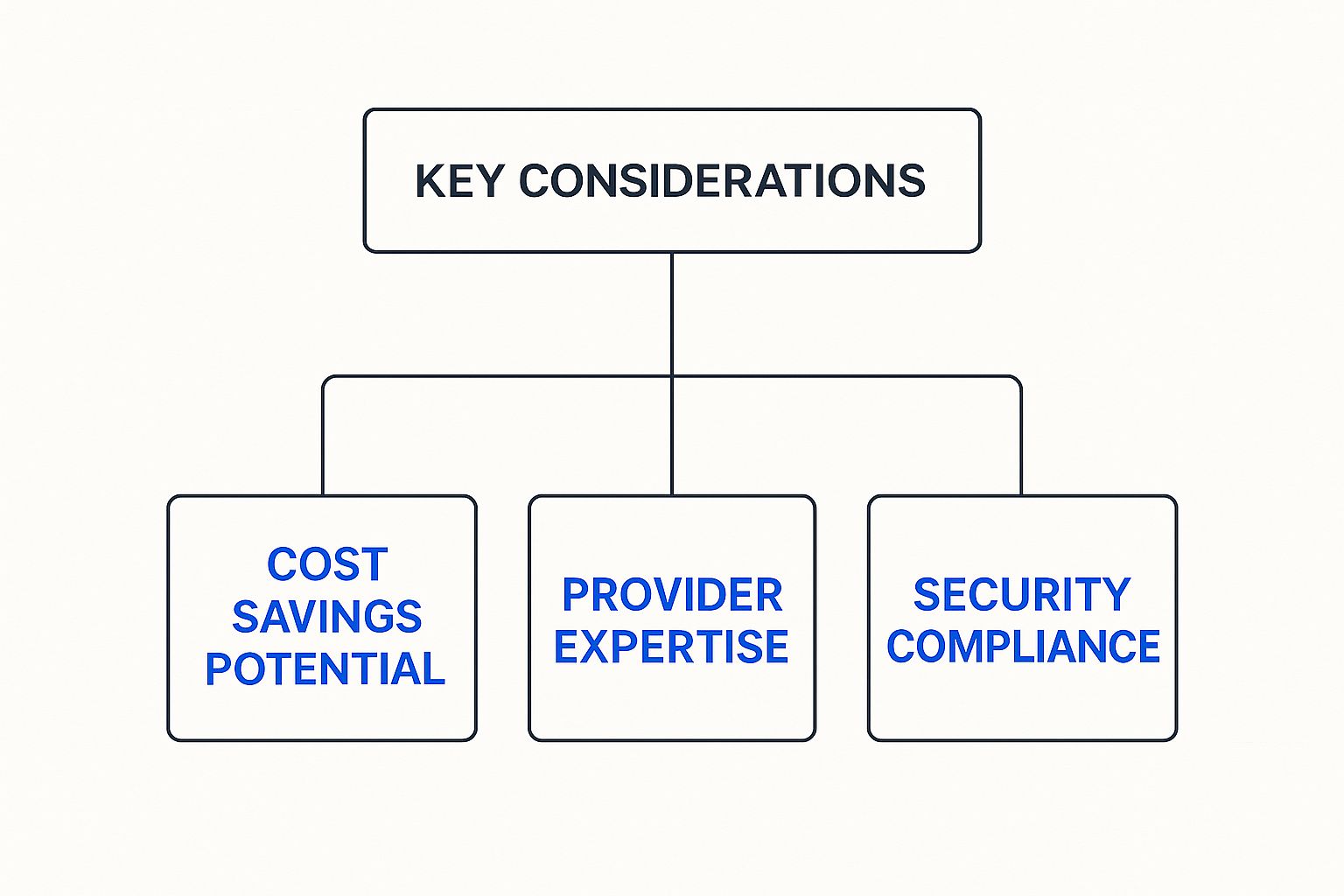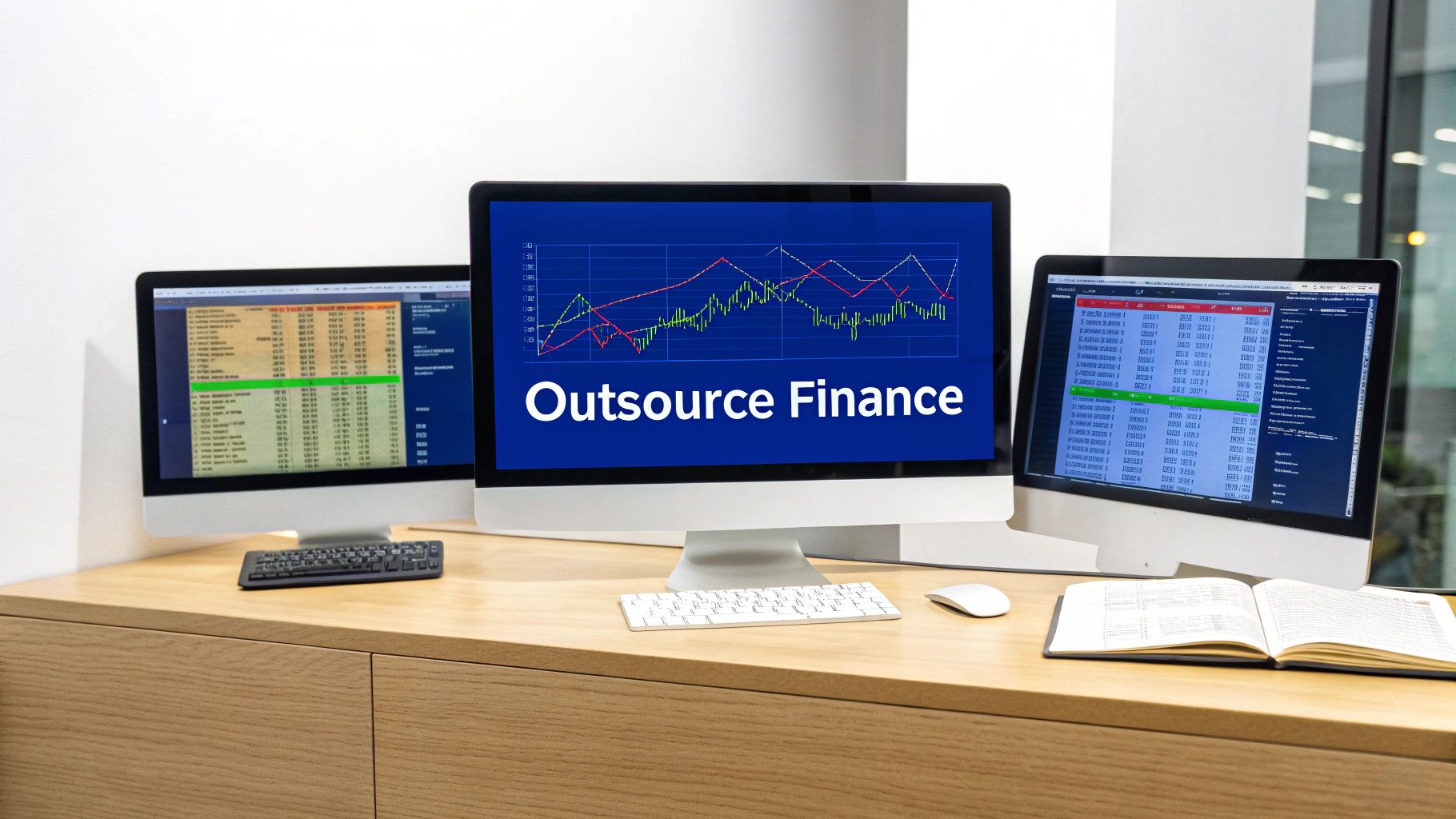Finance and accounting outsourcing is simply a way for a business to hand over its financial tasks—from the daily grind of bookkeeping to high-level financial forecasting—to a specialised, external firm. It’s a move that gives you immediate access to seasoned experts and sophisticated technology, often for much less than it would cost to build and manage an equivalent team in-house.
Defining Your Virtual Finance Department
Think of your business as a high-performance vehicle. Your job is to focus on driving it forward—innovating, selling, and keeping customers happy. But you still need a top-notch pit crew to manage the engine. Finance and accounting outsourcing provides that expert crew, working tirelessly behind the scenes to make sure every part of your financial machine is running perfectly.
This isn’t just about getting rid of paperwork. It’s about embedding a team of specialists into your operations who live and breathe financial management. This frees up business owners from having to wear multiple hats as the bookkeeper, tax advisor, and financial analyst. Instead, you get a partner dedicated to your company’s financial health, giving you the clarity and time to focus on what you do best. You can get a broader view of this by exploring our guide on what an outsourcing company does.
What Services Are Typically Outsourced?
The great thing about outsourcing is that it's not a one-size-fits-all solution. A small startup might just need help with the basics, whereas a rapidly scaling business might decide to hand over its entire finance department.
Some of the most commonly outsourced services include:
- Transactional Tasks: This is the day-to-day stuff. Think accounts payable (paying your bills), accounts receivable (chasing invoices), and bank reconciliations.
- Payroll Processing: Making sure everyone gets paid correctly and on time, which includes handling taxes, pensions, and staying compliant with UK employment law.
- Bookkeeping and Financial Reporting: Keeping the books clean and producing essential reports like profit and loss statements and balance sheets so you always know where you stand.
- Tax Preparation and Compliance: Managing everything from VAT returns to corporation tax, ensuring all your filings meet HMRC’s deadlines and rules.
- Strategic Financial Advice: This is where you can really level up, getting access to a virtual Chief Financial Officer (CFO) for help with budgeting, forecasting, and long-term financial strategy.
This isn't just a niche trend; it's a major market movement. The UK's Business Process Outsourcing (BPO) market, where finance services play a huge role, is expected to be worth USD 31.46 billion by 2025.
The Growing Appeal in the UK Market
This surge in popularity is driven by a real need for smarter, more efficient financial management. UK businesses are catching on to the fact that modern outsourcing delivers far more than just cost savings. It offers a genuine competitive advantage by providing access to automation, better data analytics, and specialised skills that would otherwise be out of reach.
By handing these critical functions over to a trusted partner, companies can better handle economic ups and downs, scale without chaos, and make sharper, data-backed decisions. It’s a strategic shift that fundamentally strengthens the financial backbone of the business.
Why UK Businesses Outsource Financial Operations

It’s a common misconception that finance and accounting outsourcing is all about pinching pennies. While cost savings are certainly part of the appeal, the real story is much bigger. For a growing number of UK businesses, this move is a strategic play for top-tier talent, advanced technology, and most importantly, the freedom to focus on what they do best.
Think of it less as a cost-cutting tactic and more as a strategic liberation. It’s about getting financial administration off your plate so you can pour that energy back into innovation, nurturing customer relationships, and expanding your market footprint.
Accessing Top Talent Instantly
Let's be honest, finding and keeping skilled accounting professionals in the UK is a real headache right now. There's a noticeable skills gap, which means the recruitment process is often a long, competitive slog with no guarantee you’ll find the right person for your team.
This is where outsourcing completely changes the game. Instead of spending months searching for one perfect candidate, you get immediate access to a whole team of specialists who have been there and done that. These are seasoned professionals with experience across countless industries, bringing a depth of knowledge that’s incredibly difficult and expensive to build from scratch.
It's a widespread issue. A recent Robert Half survey found that over 90% of senior managers in the UK struggle to recruit qualified accountants for their in-house teams.
Gaining a Technological Edge
Modern finance runs on powerful software for everything from automation to complex analytics. For most small and medium-sized businesses, the cost of licensing, implementing, and training a team on these enterprise-level tools is just not feasible.
Outsourcing is the great equaliser here. The best providers have already shelled out for the top-of-the-line technology. When you partner with them, their high-powered tech stack becomes your tech stack.
- Automation Platforms: Imagine software that handles all the tedious jobs like invoice processing and bank reconciliations, slashing manual errors and saving huge amounts of time.
- Analytical Software: These are sophisticated systems that can deliver deep financial insights, from cash flow forecasting to interactive performance dashboards.
- Cloud-Based Systems: You get secure, 24/7 access to your financial data, giving you a real-time view of your business's health from anywhere in the world.
Many UK businesses turn to outsourcing simply to escape their 'Excel headaches' and to use financial analytics to drive SMB growth. It cleverly turns what would be a massive capital investment into a predictable, manageable operating cost.
By outsourcing, you’re not just delegating tasks; you are acquiring a ready-made, high-tech financial infrastructure. This allows your business to operate with the same efficiency and analytical power as a much larger corporation, without the massive upfront investment.
Achieving Unmatched Scalability and Flexibility
Business is never static. Your financial needs can shift dramatically from one quarter to the next—maybe you’re launching a new product, expanding into Europe, or just navigating a choppy economic climate.
An in-house finance team is a fixed cost. Ramping it up means going through that slow, expensive hiring cycle again. Downsizing often means making tough choices and losing valuable institutional knowledge. An outsourced partner, on the other hand, gives you genuine elasticity.
As your business grows, your provider can effortlessly scale up their support to manage higher transaction volumes or more complex reporting. If you need to pull back and tighten the budget, you can just as easily scale down the services. This on-demand flexibility ensures your financial function is always perfectly aligned with your business needs, giving you a stable foundation in a constantly changing world.
Choosing Your Finance Outsourcing Model
So, you've decided that finance and accounting outsourcing makes sense for your business. That's a great first step, but now comes the real question: what kind of partnership do you actually need? Outsourcing isn't a one-size-fits-all solution. The right approach for you hinges entirely on your budget, how you like to work, and what you're trying to achieve.
It’s a bit like choosing a new vehicle. You wouldn't buy a massive lorry if all you need is a nimble car for city driving. In the same way, your outsourcing model has to be the right fit for your company's specific journey.
Onshore, Nearshore, and Offshore: What's the Difference?
One of the first things to decide is geography. Where your outsourced team is based will have a huge impact on everything from cost and communication to cultural fit. Each option has its pros and cons, so it’s important to understand what you’re signing up for.
Let's look at the three main models:
- Onshore Outsourcing: This means you're working with a firm based right here in the UK. The biggest plus is easy, seamless communication. There are no time zone headaches or cultural wires to get crossed. It's the perfect choice for businesses that need constant, real-time collaboration, but it's also usually the most expensive.
- Nearshore Outsourcing: With this model, you partner with a provider in a nearby country, often in Eastern Europe. You get a significant cost saving compared to staying onshore, but the time difference is minimal—maybe an hour or two. This makes it a really popular middle ground, giving you a great balance of cost-efficiency and convenience.
- Offshore Outsourcing: Here, you're partnering with a firm much further afield, in places like India or the Philippines. Offshoring delivers the biggest cost reductions, sometimes cutting labour expenses by as much as 70%. You'll need a solid plan for managing the time zone differences, but it opens up a massive pool of talent and can even enable round-the-clock workflows.
Choosing between these comes down to what you prioritise. This diagram lays out the key factors to weigh up.

As you can see, it's not just about cost. You have to think carefully about the skills you need and how sensitive your data is.
To help you compare these options at a glance, here's a simple breakdown.
Comparing Finance Outsourcing Models
Ultimately, there’s no single "best" choice—only the one that aligns best with your business priorities and operational style.
Engagement Models: How Deep Do You Want to Go?
Location is one piece of the puzzle. The other is how you structure the relationship. How deeply will this new team be integrated into your business? This can range from bringing someone in for a one-off project to handing over your entire finance function.
Choosing the right service structure is about aligning the provider's role with your strategic needs. It’s the difference between hiring a consultant for a specific problem and appointing a new director to your board.
Let's break down the common ways to structure this partnership.
- Project-Based Outsourcing: Think of this as a short-term, tactical strike. You hire a firm for a specific task with a clear start and finish, like a one-time financial audit, cleaning up messy historical books, or rolling out new accounting software. It's a focused solution for a defined problem.
- Staff Augmentation: In this scenario, you're essentially "renting" an expert. You bring in one or more professionals from a provider to work as an extension of your own team. They'll report to your managers and fill a specific gap—maybe you need a tax specialist during filing season or a payroll pro to cover for someone on leave. You get the expertise you need, but you keep direct control.
- Fully Managed Services: This is the most hands-off approach. You delegate an entire function—like accounts payable, or even your whole finance department—to the provider. They take complete ownership of the people, the processes, and the tech, delivering results based on an agreed-upon Service Level Agreement (SLA). This model frees you up completely from financial admin, letting you focus on what your business does best.
Weighing the Benefits Against Potential Risks

Deciding to outsource your finance and accounting function is a big move. It’s essential to go in with your eyes wide open, understanding both the incredible upsides and the potential pitfalls.
A smart strategy isn’t about hoping for the best; it’s about knowing the challenges and planning for them from day one. This balanced view is what allows you to really capture the benefits while keeping any downsides firmly in check.
Let's break down what draws businesses to this model, before taking an honest look at the risks and, crucially, how to manage them.
The Upside: A Wealth of Strategic Advantages
The most obvious win, and the one that gets the most attention, is cost. It’s simple maths, really. Outsourcing helps you sidestep the hefty, fixed costs of an in-house team—salaries, benefits, National Insurance, office space, and software licences all add up. Exploring proven strategies to save expenses can put this into a wider context of smart financial management.
But the real magic happens beyond just the balance sheet.
Razor-Sharp Efficiency and Accuracy: Good outsourcing firms have seen it all. They use slick, automated processes that have been fine-tuned across hundreds of clients, slashing the manual errors that can plague in-house teams and speeding up everything from invoicing to your month-end reports.
Watertight Compliance: Keeping on top of UK tax law, VAT rules, and Companies House deadlines is a full-time job in itself. A specialist provider lives and breathes compliance. It’s their core business to ensure you meet every obligation, minimising the risk of painful penalties.
Access to a Bench of Experts: Suddenly, you have a whole team of pros on your side, from certified bookkeepers to high-level financial analysts. For a small or medium-sized business, hiring that level of expertise directly would be incredibly expensive, if not impossible.
Addressing the Potential Downsides Head-On
Of course, no business decision is completely risk-free. The good news is that the common worries about finance outsourcing are entirely manageable if you choose your partner wisely and set things up correctly.
The number one concern is usually data security. Handing over your company's most sensitive financial information is a big deal. You need to know your data is safe from breaches and that privacy, especially under GDPR, is being handled properly.
Another classic pitfall is the risk of hidden costs. That initial low price can look very attractive, but without a rock-solid agreement, you could get stung with extra charges for "out-of-scope" work. Those little extras can quickly eat away at your expected savings.
Finally, there’s the challenge of managing a remote relationship. Communication can feel like a weak link, especially with offshore partners in different time zones. Without a clear rhythm, you can end up with delayed answers and a frustrating sense of being disconnected from your own numbers. For a deeper dive, check out our article on the advantages and disadvantages of outsourcing.
The UK finance and accounting outsourcing market was valued at approximately USD 54.79 billion in 2025, with projections showing strong growth. However, this expansion brings heightened scrutiny on data privacy and cybersecurity, making robust due diligence on providers more critical than ever under UK financial regulations and GDPR.
Smart Mitigation Strategies for Peace of Mind
The secret to great outsourcing isn't about avoiding risks—it's about tackling them head-on. A proactive approach turns potential problems into simple checkpoints.
Here’s how you can protect your business:
Do Your Homework (Rigorously): Don't just browse their website. Ask for solid proof of their security credentials, like an ISO 27001 certification. Dig into their GDPR policies and ask direct questions about how they encrypt and store client data.
Get a Crystal-Clear Service Level Agreement (SLA): Your contract is your bible. It must spell out the exact scope of services, the full pricing structure, and what happens when you need something extra. This kills ambiguity and prevents nasty surprise bills later.
Set Up Strong Communication Channels: Before you sign anything, agree on how you'll talk. Who is your main point of contact? How often will you have update meetings? What are the expected response times for emails? Nailing this down ensures you always feel in control.
By thoughtfully weighing the pros against the cons and putting these simple strategies in place, you can move forward with confidence, making outsourcing a powerful engine for growth instead of a source of stress.
How to Select the Right Outsourcing Partner

Picking your finance and accounting outsourcing partner is easily the most critical choice you'll make. This isn't just about handing over your bookkeeping to a third party. It’s about finding a long-term strategic ally who will become a core part of your business operations.
When it works, the right firm feels like a natural extension of your own team. They don't just process transactions; they offer proactive advice and insights that genuinely help you grow. You’re looking for a partner who is truly invested in your success, backed by the right expertise and technology to make it happen. This takes a bit of thoughtful evaluation.
Evaluate Industry-Specific Expertise
Every industry has its own financial language. Think about the specific revenue recognition rules in the software world or the intricate supply chain costs in manufacturing. A generalist accountant might grasp the basics, but an expert in your field will already know the unique challenges and opportunities you're up against.
This kind of specialised knowledge is gold. It translates into more accurate reporting and much sharper strategic planning. When you’re vetting potential firms, be direct. Ask about their experience with businesses just like yours and see if they can share case studies or client references from your sector.
Scrutinise Their Technology Stack
In today's world, modern accounting runs on great technology. Your outsourcing partner should be using current, cloud-based software that gives you both efficiency and a real-time window into your finances. Clunky, desktop-based systems are a recipe for data delays and security headaches.
Don't be shy during the evaluation. Ask them exactly what tools they use for the important stuff:
- Core Accounting: Are they on platforms like Xero or QuickBooks Online? These are the industry standard for a reason.
- Data Automation: What do they use for capturing receipts and processing invoices? Look for tools like Dext that cut down on manual work.
- Reporting and Analytics: Can they provide insightful dashboards and custom reports that are easy to understand?
Their tech shouldn't just make their life easier—it should empower you with the financial information needed to make smart, timely decisions.
Verify Security and Compliance Protocols
You're about to hand over some of your most sensitive company data, so their security had better be rock-solid. A data breach could be devastating, which makes this a non-negotiable part of your checklist.
Learning how to find a reliable accountant who takes this seriously is a crucial first step. Your due diligence should involve checking their compliance with UK regulations like GDPR and asking if they hold any security certifications, such as ISO 27001 for information security management.
Your partner should be able to clearly articulate their data protection policies, including how data is encrypted, where it is stored, and who has access to it. Vague answers on security are a major red flag.
Assess Communication and Cultural Fit
Technical skills are a given, but a great partnership really hinges on communication and a good cultural fit. You need a team that is responsive, proactive, and speaks your language. It's wise to agree on a communication rhythm right from the start, whether that means weekly calls or a formal monthly review.
At its heart, this is a human relationship. You need to feel comfortable with the people you’ll be working with. It's much like the logic behind https://www.beyondhire.co/blog/outsourcing-recruitment-benefits, where cultural alignment is key to making the relationship work. The goal is to find a partner who truly feels like part of your own team.
Answering Your Questions About Outsourcing
Making the decision to outsource your finance and accounting is a big step. Even after you’ve weighed up the pros and cons and looked at the different ways to do it, it’s completely normal to have a few questions still buzzing around.
Getting clear, straight answers to these common worries is the final piece of the puzzle. It’s what helps you move from uncertainty to making a choice you can stand behind. Below, we tackle the most frequent questions and hesitations we hear from business owners before they partner with an outsourced finance team.
Our aim here is to give you the clarity you need to move forward, confident that you have the right information to build a brilliant partnership.
How Much Does Finance Outsourcing Cost in the UK?
It’s the question on every business owner’s mind: what’s the damage? The honest answer is, there’s no one-size-fits-all price tag for finance outsourcing in the UK. The cost really depends on the complexity of your business and exactly what you need help with.
For example, a small start-up that just needs some basic bookkeeping and VAT returns sorted could find a monthly package starting from a few hundred pounds. On the other end of the scale, a fast-growing company looking for the full works—including a virtual Finance Director for strategic forecasting—might be looking at several thousand pounds per month.
The most important thing is predictability. Most good firms work on a fixed monthly retainer, so you always know what you’re paying.
Always ask for a detailed proposal that breaks down every single service included in your fee. This transparency is vital to avoid ‘scope creep’ and surprise bills down the line, making sure the partnership stays cost-effective.
This model also means you can easily scale services up or down as your business grows or your needs change, making it a flexible investment in your company’s financial health.
Is My Company's Financial Data Secure?
Handing over your financial data requires a huge amount of trust, so it’s no surprise that data security is a massive concern. Any outsourcing firm worth its salt understands this completely and makes security a top priority, often using safeguards that are far more robust than what a typical small business could afford to implement on its own.
When you’re talking to potential partners, you need to be direct about their security. Don't be shy about asking specific questions on how they comply with UK regulations like GDPR. A provider you can trust will be open and transparent about their protocols.
Here are a few things to look for:
- Certifications: Ask if they have certifications like ISO 27001, the international gold standard for information security management.
- Data Encryption: Make sure all your data is fully encrypted, both when it's being stored and when it's being sent.
- Access Controls: Find out exactly who on their team will have access to your data and what systems they have in place to control and monitor that access.
Your Service-Level Agreement (SLA) should clearly spell out their security responsibilities, giving you both legal assurance and peace of mind.
What Is the Onboarding Process Like?
Getting off to a smooth start is crucial for any new partnership. A well-planned onboarding process ensures your new finance team can get up to speed quickly and efficiently, without causing major disruption to your day-to-day business.
It’s not a case of flicking a switch overnight. The process usually unfolds in clear, structured stages, designed to get everything right from day one.
A typical onboarding journey looks something like this:
- Discovery Phase: It all starts with a deep dive into your business. Your new partner will get to know your current processes, your biggest challenges, and your goals for the future.
- Transition and Setup: Next comes the technical part, where they migrate your financial data to their systems and set up all the necessary software integrations.
- Parallel Running: For a short period, many firms will run their new processes alongside your old setup. This is a critical step to iron out any wrinkles and double-check for accuracy before the final handover.
Depending on how complex your finances are, the whole process can take anywhere from a few weeks to a couple of months.
Will I Lose Control Over My Finances?
This is probably the biggest myth about outsourcing. There’s a common fear that handing over financial tasks means losing your grip on the numbers that drive your business. The reality is quite the opposite. Good finance and accounting outsourcing should actually give you more control, not less.
Think of it this way: right now, you might be swamped by the daily grind of processing invoices or reconciling bank accounts. By delegating those time-sucking tasks, you free yourself up to focus on the bigger picture.
Instead of losing control, you gain a clearer, more strategic command of your finances. You get access to better, real-time reports, simple dashboards, and expert analysis that you simply didn't have before. This shifts your role from being a doer to being a decision-maker, giving you the high-level insights you need to steer your business with real confidence. A great partner doesn’t take control; they empower you, making sure you always feel like you’re the one in the driver's seat.

